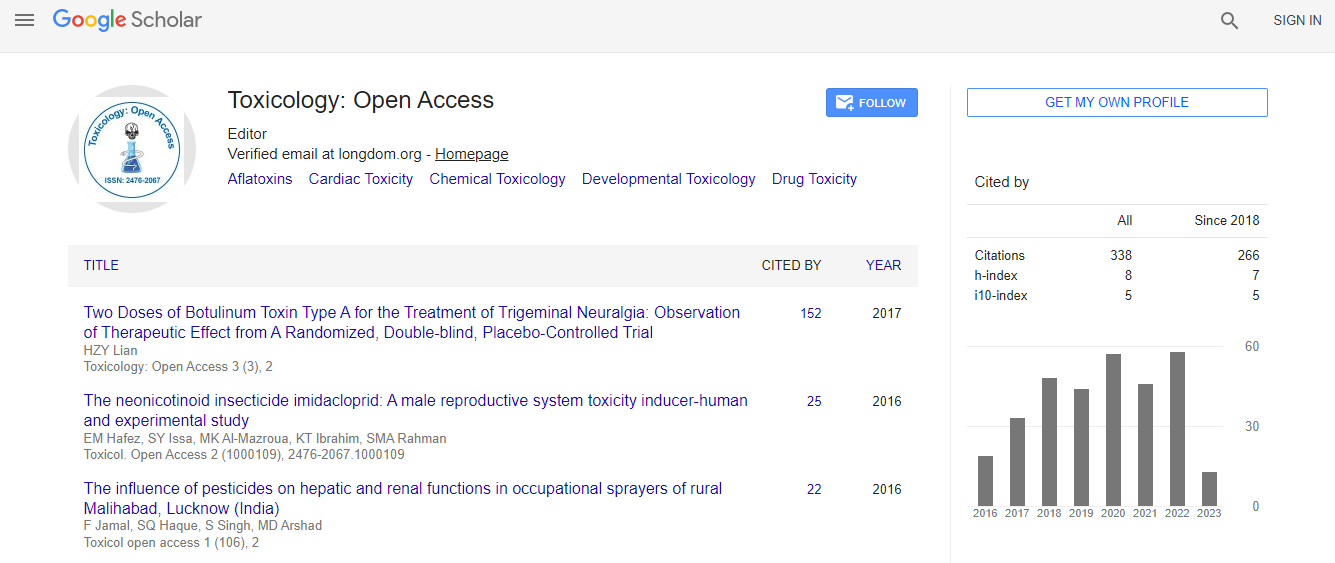Our Group organises 3000+ Global Conferenceseries Events every year across USA, Europe & Asia with support from 1000 more scientific Societies and Publishes 700+ Open Access Journals which contains over 50000 eminent personalities, reputed scientists as editorial board members.
Open Access Journals gaining more Readers and Citations
700 Journals and 15,000,000 Readers Each Journal is getting 25,000+ Readers
Google Scholar citation report
Citations : 336
Toxicology: Open Access received 336 citations as per Google Scholar report
Indexed In
- Google Scholar
- RefSeek
- Hamdard University
- EBSCO A-Z
- Geneva Foundation for Medical Education and Research
- Euro Pub
- ICMJE
Useful Links
Related Subjects
Share This Page
Editorial Board
Submit Manuscript
Journal Impact Factor 1.55*
Submit manuscript at https://www.scholarscentral.org/submissions/toxicology-open-access.html or send as an e-mail attachment to the Editorial Office at toxicology@expertsmeet.org
If you are interested in publishing with us or have any questions, please feel free to contact us directly on WhatsApp .
Table of Contents
About the Journal
PubMed NLM ID: 101744275
The Toxicology Open Access Journal is a Scholarly journal that deals with the study of xenobiotic and also study toxic effects of agents (drugs) whose purpose is to provide relief or prevent a disease. Toxicology is a branch of science & medicine that is concerned with the study of adverse effects caused by chemical on living organisms. The journal addresses both scientific research and clinical advances in toxicology. The Journal of Toxicology accepts all types of articles like research, review, case reports, commentaries, hypotheses, meeting reports and short reports.
The Toxicology Open Access is peer-reviewed scientific journal that dealing with articles on different aspects of Toxicology Reports, Toxicology Tests, Developmental Toxicology, Chemical Toxicology, pesticidal Toxicology, Toxicogenomics, Chemical Toxicology, Reproductive Toxicology, Toxicological sciences, Environmental Toxicology, Skin Toxicology, Cardiac toxicity, Renal Toxicity, Nano Toxicology, Lung toxicity, Drug toxicity, Heavy metal toxicity, Aflatoxins, Tetanus toxin, Toxicology, Industrial Toxicology, Heavy Metal Toxins, Pesticide Toxicology, Industrial Hygiene Toxicology, Metal Toxicology, Cadmium Toxicology, Insecticides Toxicology and Benzene Toxicology.
Toxicology Open access is using Editorial Tracking System for quality in review process. Editorial Tracking is an online manuscript submission, review and tracking systems used by most of the best open access journals. Review processing is performed by the editorial board members of journal or outside experts; at least two independent reviewers approval followed by editor's approval is required for acceptance of any citable manuscript.
manuscripts as online Editorial tracking or as an e-mail attachment to manuscripts@omicsonline.com.
OMICS International organizes 1000+ conferences every year across USA, Europe & Asia with support from 1000 more scientific societies and publishes 700+ open access journals which contains over 50000 eminent personalities, reputed scientists as editorial board members.
Reproductive Toxicology
It deals with toxic substances that effects reproductive system. It also deals with infertility, sexual dysfunction, spontaneous abortion, malformations, abnormal histogenesis, stillbirth, intrauterine growth retardation, prematurity and perinatal mortality.
Related Journals of Reproductive Toxicology
Journal of Toxicology, Health Care Journal, Medicine Journal, Microbiology Journal, Toxicology Journal, Journal of Drug Metabolism & Toxicology, Journal of Clinical Toxicology, Journal of Pharmacovigilance, Advances in Pharmacoepidemiology & Drug Safety, Archives of Toxicology
Toxicogenomics
Field of science deals with gene and protein within a particular cell or tissue of an organism in relation to toxic substances. It is the combination of genomics and toxicology. It provides information regarding molecular mechanisms involved in toxicity expression.
Related Journals of Toxicogenomics
Clinical toxicology, Medicine Journal, Microbiology Journal, Biochemistry Journal, Toxicology Journal, Environmental Toxicology, Journal of Toxicological Sciences, Journal of Forensic Toxicology and Pharmacology, Journal of Environmental & Analytical Toxicology
Skin Toxicology
Skin toxicology deals with toxins that effect the integrity and functioning of the skin. When a toxin reaches the skin it results in redness, pain, heat and swelling of the affected area. It mainly deals with toxins like pesticides and fungicides.
Related Journals of Skin Toxicology
Toxicology journals, Health Care Journal, Medicine Journal, Microbiology Journal, Toxicology Journal, Farmacia Hospitalaria, Pharmacy World & Science, Value in Health, Research in Social & Administrative Pharmacy, Journal of The American Pharmacists Association, Journal of Clinical Pharmacy and Therapeutics
Renal Toxicity
Renal toxicity also referred as Nephrotoxicity. It is the effect of both toxins and medicines on the kidney. Renal toxicity is seen in renal impairment patients. Decreased creatinine levels in blood and serum creatinine indicates renal impairment. Nephrotoxicity is a poisonous effect of some substances, both toxic chemicals and medication, on the kidneys.
Related Journals of Renal toxicity
Toxicological journals, Health Care Journal, Medicine Journal, Microbiology Journal, Toxicology Journal
Industrial Hygiene Toxicology
Industrial hygiene toxicology involves in health issues during exposure in a work place. This branch plays a major role in protection of personnel and surrounding community. They address the health events in acute events. Industrial hygienists and toxicologists are specialists who most commonly provide support through the on-site incident command structure during active response situations.
Related Journals of Industrial Hygiene Toxicology
Toxicity journals, Medicine Journal, Microbiology Journal, Biochemistry Journal, Toxicology Journal, Journal of Pharmacy Practice, International Journal of Pharmaceutical and Healthcare Marketing, Annual Review of Pharmacology and Toxicology, Toxicology and Applied Pharmacology
Tetanus Toxin
Tetanus toxin also referred as spasmogenic toxin. It is produced by clostridium tetani in anaerobic conditions. It is a potential neurotoxin and LD50 is 1ng/kg.It spreads to vascular systems and lymphatic systems. The presence of the bacteria does not cause the disease but instead the toxins it produces cause the disease state
Related Journals of Tetanus Toxin
Toxicology Related Journals, Health Care Journal, Medicine Journal, Microbiology Journal, Toxicology Journal, Environmental Toxicology and Chemistry, Chemical Research in Toxicology, Toxicology, Food and Chemical Toxicology, Toxicology Letters
Drug Toxicity
Drug toxicity is also known as drug intoxication. It is uncommon cause of death. Drug toxicity generally occurs by the combination of different drugs. Drug toxicity leads to breathing suppression, lowers oxygen levels and finally fatal. Drugs become toxins when they combine with other drugs and thus causes chemical changes and causes side effects.
Related Journals of Drug Toxicity
Clinical Research in Toxicology, Health Care Journal, Medicine Journal, Microbiology Journal, Toxicology Journal, Aquatic Toxicology, Mutation Research - Genetic Toxicology and Environmental Mutagenesis, NeuroToxicology, Ecotoxicology and Environmental Safety,Archives of Environmental Contamination and Toxicology
Toxicology Reports
Toxicology reports contain information related to research and clinical aspects. These reports provide basic information regarding toxicology such as effects of xenobiotic on humans and animals. Toxicology case reports, natural products toxicology, computational and predictive toxicology are also discussed in these reports.
Related Journals of Toxicology Reports
Environmental Toxicology Journals, Medicine Journal, Microbiology Journal, Biochemistry Journal, Toxicology Journal, Critical Reviews in Toxicology, Reproductive Toxicology, Neurotoxicology and Teratology,Toxicology in Vitro,Archives of Toxicology
Toxicology Testing
Toxicology testing is performed to detect the presence of drugs or chemicals. Toxicology tests helps in detecting the cause of life threatening diseases, in case of emergency. These tests are performed in athletes to improve their athletic ability. A toxicology test may check for one specific drug or for up to 30 different drugs at once. Testing is often done on a urine or saliva sample instead of blood, because urine and saliva tests are usually easier to do than blood tests and many drugs show up in either urine or saliva.
Related Journals of Toxicology Testing
Journal of Medical Toxicology, Health Care Journal, Medicine Journal, Microbiology Journal, Toxicology Journal, Clinical Toxicology, Regulatory Toxicology and Pharmacology, Basic and Clinical Pharmacology and Toxicology, Journal of Toxicology and Environmental Health - Part A: Current Issues, Ecotoxicology
Chemical Toxicology
It is a multidisciplinary field that has machine and artificial chemistry, additionally to folks that focus on the fields of genetic science, drug metabolism, metabolomics, drug discovery, bioinformatics, analytical chemistry, biological chemistry and molecular medicine. It depends on technological advances to assist perceive the chemical elements of materia medica. It focuses on the structure of chemical agents and the way it affects their mechanism of action on living organisms.
Related Journals of Chemical Toxicology
Journal of Clinical Toxicology, Medicine Journal, Microbiology Journal, Biochemistry Journal, Toxicology Journal, Inhalation Toxicology, Human and Experimental Toxicology, Journal of Analytical Toxicology, Journal of Applied Toxicology, Comparative Biochemistry and Physiology - C Pharmacology Toxicology and Endocrinology
Pesticidal Toxicology
Toxicology deals with pesticides which are used for the control of pests. The relative hazard of a chemical depends upon the toxicity of the chemical, the dose received and therefore the length of your time exposed. The hazard in employing a chemical is expounded to the chance of exposure to harmful amounts of the chemical. Exposure will be influenced by concentration of the chemical and instrument used for application.
Related Journals of Pesticidal Toxicology
Journal of Medical Toxicology, Health Care Journal, Medicine Journal, Microbiology Journal, Toxicology Journal, Journal of Toxicology and Environmental Health - Part B: Critical Reviews, Environmental Toxicology, Particle and Fibre Toxicology, Environmental Toxicology and Pharmacology, Expert Opinion on Drug Metabolism and Toxicology.
Developmental Toxicology
Developmental pharmacological medicine could be a science finding out adverse organic process outcomes. Developmental toxicity is any structural or useful alteration, reversible or irreversible, that interferes with physiological condition, traditional growth, differentiation, development or behaviour and that is caused by environmental insult.
Related Journals of Developmental Toxicology
Invitro Toxicology Journal, Medicine Journal, Microbiology Journal, Biochemistry Journal, Toxicology Journal, Reviews of Environmental Contamination and Toxicology, Bulletin of Environmental Contamination and Toxicology, Cell Biology and Toxicology, Birth Defects Research Part B - Developmental and Reproductive Toxicology.
Cardiac Toxicity
Cardiac toxicity refers to heart dysfunction or cardiac muscle damage. Toxicity to heart can be due to intake of heavy metals, eating disorder such as anorexia nervosa or incorrect administration of drugs. Cardiac toxicity leads to weakening of heart and leads to delay in circulation.
Related Journal of Cardiac Toxicity
Toxicology Impact Factor, Health Care Journal, Medicine Journal, Microbiology Journal, Toxicology Journal, Cardiovascular Toxicology, International Journal of Toxicology, Journal of Environmental Pathology, Toxicology and Oncology, Immunopharmacology and Immunotoxicology
Nano Toxicology
Nano Toxicology deals with toxic studies of nanomaterial. Due to quantum size of nanoparticles they exhibit more toxicity. Nano toxicology deals with application of nanomaterial toxicity. Nano toxicological studies are supposed to see whether or not and to what extent nanoparticles might create a threat to environment and human beings.
Related Journal of Nano Toxicology
Journal of Pharmacology & Toxicology, Health Care Journal, Medicine Journal, Microbiology Journal, Toxicology Journal, Mutation Research - Genetic Toxicology Testing and Biomonitoring of Environmental or Occupational Exposure, Environmental Carcinogenesis and Ecotoxicology Reviews, Veterinary and Human Toxicology, Drug and Chemical Toxicology
Heavy Metal Toxicity
Lead, mercury and cadmium are examples of heavy metals. Treatment of metal toxicity may be chelation therapy. Acute heavy metal intoxications mainly damages central nervous function, lungs, kidneys, liver, endocrine glands and bones. Risk factors for metal poisoning may be overexposure to concentrations that occur naturally (e.g., arsenic-rich mineral deposits) or human activities
Related Journal of Heavy Metal Toxicity
Toxicology Research Journal Impact Factor, Health Care Journal, Medicine Journal, Microbiology Journal, Toxicology Journal, Annual Review of Pharmacology and Toxicology,Toxicology and Applied Pharmacology, Mutation Research - Reviews in Genetic Toxicology, Journal of Medical Toxicology.
Aflatoxins
Mycotoxins are also known as aflatoxins. These are naturally occurring produced by fungi species. These are carcinogenic and toxic to the body. Aflatoxins producing species are widely spread in nature and present in host crops such as maize, groundnuts and sorghum. FDA has approved 20 and 300ppb levels of aflatoxin in food.
Related Journal of Aflatoxins
Clinical Toxicology, Medicine Journal, Microbiology Journal, Biochemistry Journal, Toxicology Journal, Environmental Toxicology, Journal of Toxicological Sciences, Journal of Forensic Toxicology and Pharmacology, Journal of Environmental & Analytical Toxicology
Heavy Metal Toxins
Heavy metals such as lead, mercury, arsenic and cadmium are commonly associated with metal poisoning. Zinc, copper, chromium, iron and manganese are required in small amounts to our body but when present in excess leads to toxicity.They cause damage to internal organs such as renal impairment, CNS damage.
Related Journal of Heavy Metal Toxins
Journal of Toxicology & Environmental Health Sciences, Medicine Journal, Microbiology Journal, Biochemistry Journal, Toxicology Journal, Annual Review of Pharmacology and Toxicology,Toxicology and Applied Pharmacology, Mutation Research - Reviews in Genetic Toxicology, Journal of Medical Toxicology.
Insecticides Toxicology
Branch of toxicology deals with insecticides. Most of the insecticides enter through skin. Some of the insecticides are volatile and enter through inhalation into the body. This branch also deals with safety, degradation and refinement of insecticides in environment. Laboratory investigations provide a better understanding of insect- insecticide or insect-plant-insecticide-soil interactions.
Related Journals of Insecticides Toxicology
Toxicology journals, Health Care Journal, Medicine Journal, Microbiology Journal, Toxicology Journal, Aquatic Toxicology, Mutation Research - Genetic Toxicology and Environmental Mutagenesis, NeuroToxicology, Ecotoxicology and Environmental Safety,Archives of Environmental Contamination and Toxicology
Metal Toxicology
Metal cyanogenicity or metal poisoning is the toxic impact of sure metals in sure forms and doses on life. Some metals are cyanogenic. Toxic metals interfere the metabolic process which leads to illness. Metals in oxidised form are harmful and toxic. The toxicity of heavy metals depends on a number of factors. Specific symptomatology varies according to the metal in question, the total dose absorbed, and whether the exposure was acute or chronic. The age of the person can also influence toxicity.
Related Journal of Metal Toxicology
Fish Toxicology Journal, Medicine Journal, Microbiology Journal, Biochemistry Journal, Toxicology Journal, Annual Review of Pharmacology and Toxicology,Toxicology and Applied Pharmacology, Mutation Research - Reviews in Genetic Toxicology, Journal of Medical Toxicology.
Journal of Toxicology:Open access is 4th Global Summit on Toxicology August 24-26, 2015 Philadelphia, USA. The theme of the conference is “Exploring the Tailored Strategies and Lucid Technologies in Toxicology and Pharmacology ”.
Journal Highlights
Fast Editorial Execution and Review Process (FEE-Review Process):
Toxicology: Open Access is participating in the Fast Editorial Execution and Review Process (FEE-Review Process) with an additional prepayment of $99 apart from the regular article processing fee. Fast Editorial Execution and Review Process is a special service for the article that enables it to get a faster response in the pre-review stage from the handling editor as well as a review from the reviewer. An author can get a faster response of pre-review maximum in 3 days since submission, and a review process by the reviewer maximum in 5 days, followed by revision/publication in 2 days. If the article gets notified for revision by the handling editor, then it will take another 5 days for external review by the previous reviewer or alternative reviewer.Acceptance of manuscripts is driven entirely by handling editorial team considerations and independent peer-review, ensuring the highest standards are maintained no matter the route to regular peer-reviewed publication or a fast editorial review process. The handling editor and the article contributor are responsible for adhering to scientific standards. The article FEE-Review process of $99 will not be refunded even if the article is rejected or withdrawn for publication.
The corresponding author or institution/organization is responsible for making the manuscript FEE-Review Process payment. The additional FEE-Review Process payment covers the fast review processing and quick editorial decisions, and regular article publication covers the preparation in various formats for online publication, securing full-text inclusion in a number of permanent archives like HTML, XML, and PDF, and feeding to different indexing agencies.
h-index
Articles published in Toxicology: Open Access have been cited by esteemed scholars and scientists all around the world. Toxicology: Open Access has got h-index 8, which means every article in Toxicology: Open Access has got 8 average citations.
Recently Published Articles
-
Paraphenylene Diamine Toxicity ? Epidemiology and Treatment in Rural Regions of Bahawalpur, Punjab, Pakistan
Khalil Ahmad -
A Review on the Sex Difference in Lipotoxicity in Peripheral Nerves
Masahiro Ogawa -
Digitalis Toxicity
Antonello Santin -
Forensic Toxicology
Antonello Santin and James R. Olsone -
Glyphosate Intoxication Presenting with Bilateral Pneumothoraces and Boerhaave?s Syndrome: A Case Report
Beyers BD, Landman FR, Jacobs SJ, Swartbooi A, Beyers A and Rodriguez GLN -
Subacute Oral Toxicity Studies of ZingiVir-H: A Herbomineral Antiviral Drug in Wistar Rats
Hareendran Nair J and Shan Sasidharan

 Spanish
Spanish  Chinese
Chinese  Russian
Russian  German
German  French
French  Japanese
Japanese  Portuguese
Portuguese  Hindi
Hindi 




